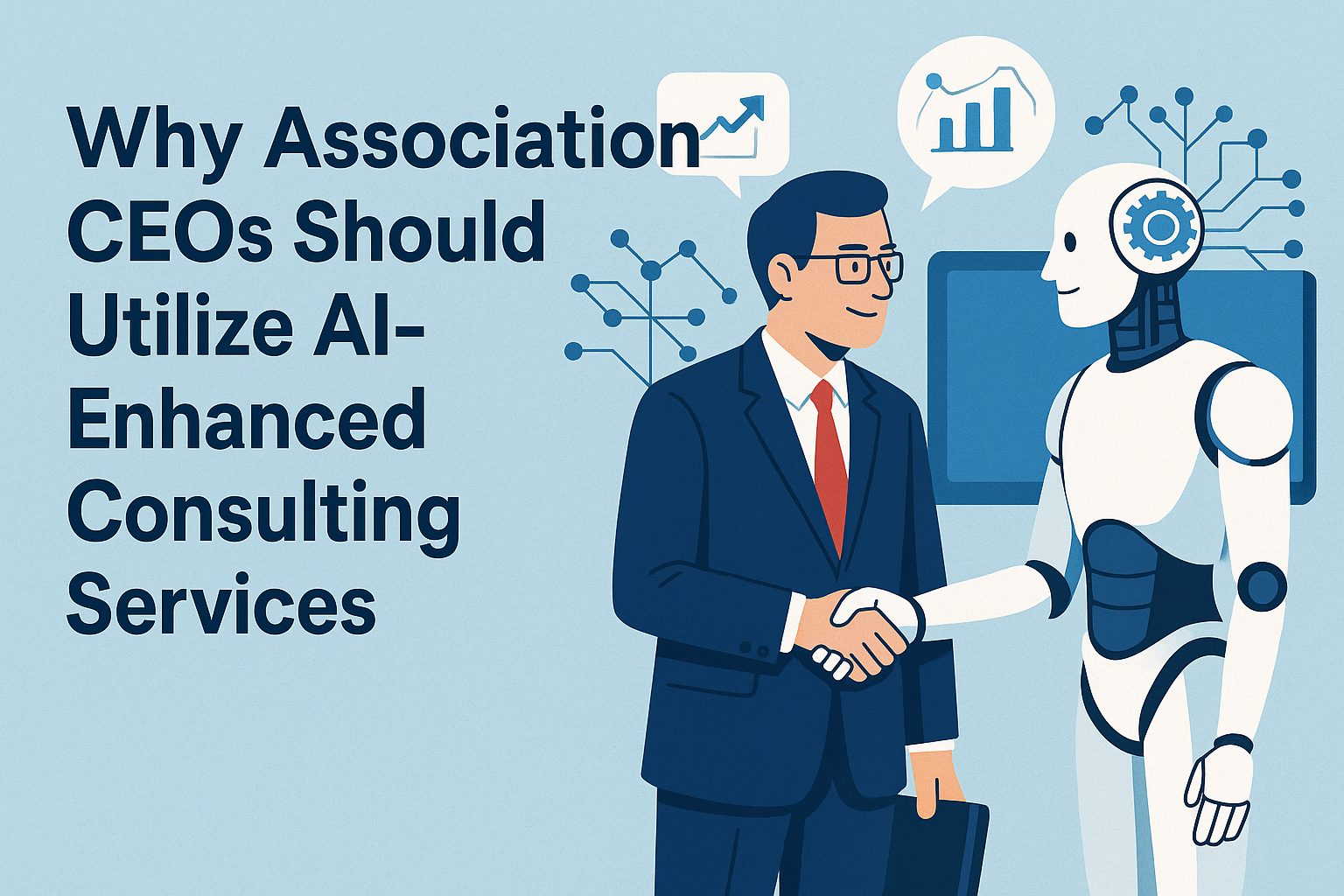What Association Leaders Need to Know

A recent debate among association consultants revealed a significant divide in our industry about the use of artificial intelligence in client engagements. While some consultants argue that AI use is somehow dishonest or deceptive, this perspective misunderstands both the technology's role and your needs as association leaders. More importantly, this debate directly impacts the quality and value of the consulting services available to your organization.
As association executives evaluating consulting partners, you deserve to understand how this technology can enhance the services you receive—and why consultants who embrace AI responsibly may deliver superior outcomes for your organization.
What Your Members and Stakeholders Expect
Your association operates in an environment where efficiency, data-driven insights, and rapid response to member needs are paramount. According to research conducted by IBM, 86% of consulting buyers are actively looking for services that incorporate AI and technology assets, while 66% say they will stop working with consulting organizations that don't incorporate AI into their services.
This isn't just about keeping up with trends—it's about ensuring your consulting partners can match the analytical sophistication and efficiency that your members increasingly expect from all professional services.
The Value Proposition: Better Analysis, Faster Results, Superior Economics
When evaluating consulting firms, consider how AI integration can deliver three critical advantages for your association:
More Comprehensive Analysis: AI-enabled consultants can analyze member engagement patterns across multiple demographic segments simultaneously, rather than sequentially. They can conduct competitive landscape analysis across 50+ peer associations in the time it traditionally took to research 10. They can model various strategic scenarios and their financial implications in days rather than weeks.
Enhanced Quality Without Premium Pricing: Leading consulting firms report 20% to 30% gains in productivity when properly leveraging AI. McKinsey's internal AI tools save consultants up to 30% of their time on research and analysis tasks. This efficiency translates to better value for your investment—either more comprehensive analysis at the same price point, or the same quality analysis at a reduced cost.
Faster Implementation: AI acceleration means your association can implement strategic initiatives sooner, realize benefits earlier, and respond more quickly to market changes. In an environment where member expectations and competitive pressures evolve rapidly, speed to implementation often determines success.
How Leading Consulting Firms Are Leveraging AI
The consulting industry's major players have made substantial investments in AI capabilities that directly benefit their clients:
Enhanced Research Capabilities: McKinsey's AI assistant synthesizes the firm's extensive knowledge base, including over 100,000 documents and interviews spanning a century, enabling consultants to quickly access relevant precedents and insights for your specific challenges.
Sophisticated Data Processing: KPMG has partnered with Google Cloud to implement platforms that integrate AI agents with company data, allowing for more sophisticated analysis of complex member datasets and industry trends.
Streamlined Service Delivery: PwC has developed over 250 internal AI agents to enhance various aspects of client service delivery, while investing $1 billion in AI capabilities over three years.
These aren't experimental ventures—they represent strategic responses to client demands for more thorough, faster, and cost-effective consulting services.
Questions to Ask Potential Consulting Partners
When evaluating consulting firms, consider asking:
- How do you leverage AI to enhance research and analysis? Look for specific examples of tools and processes, not vague promises.
- What quality control measures ensure AI-enhanced work meets professional standards? Responsible firms maintain human oversight over all AI-generated insights.
- How does your AI use translate to better value for our association? Seek concrete explanations of how efficiency gains benefit your project scope, timeline, or budget.
- How do you ensure transparency about AI involvement in our project? Professional firms should clearly communicate when and how AI enhances their work.
- What experience do you have helping associations implement AI in their own operations? Consultants using AI practically, not just theoretically, bring valuable implementation insights.
The Transparency Standard You Should Expect
Professional consulting firms should be transparent about AI use without being apologetic about it. The right framing sounds like: "We leverage AI tools to ensure our research is comprehensive, our analysis considers the broadest range of scenarios, and our recommendations are grounded in the most current data available. This allows us to focus our human expertise on strategic thinking, creative problem-solving, and understanding your association's unique culture and challenges."
Transparency should demonstrate confidence in enhanced capabilities, not defensiveness about using available tools.
Red Flags to Avoid
Be cautious of consulting firms that:
- Refuse to discuss their technology capabilities or research methodologies
- Present AI use as optional rather than integral to delivering quality service
- Cannot explain how their tools enhance rather than replace human expertise
- Lack experience with AI implementation in association contexts
- Seem defensive rather than confident about their technological capabilities
The Strategic Implications for Your Association
McKinsey research identifies AI as representing $4.4 trillion in productivity growth potential, with 92% of companies planning to increase AI investments over the next three years. Your association's consulting partners should demonstrate the same level of technological sophistication that your members are implementing in their own organizations.
When your association executives are grappling with AI implementation internally, you need advisors who understand these tools practically. More importantly, you need partners who can demonstrate the kind of efficiency and analytical sophistication you're trying to achieve in your own operations.
Making the Right Choice for Your Association
The debate among consultants about AI use reflects a profession in transition. As an association leader, your responsibility is to choose partners who can deliver the most comprehensive, insightful, and cost-effective guidance for your organization's challenges.
The consultants raising transparency concerns are right to emphasize ethical practices—these values are fundamental to quality consulting. However, in 2025, ethical practice means leveraging every available tool to provide clients with the most thorough analysis and strategic guidance possible.
The question isn't whether your consulting partners use AI. The question is whether they use it responsibly, transparently, and in ways that demonstrably enhance the value your association receives.
Your association faces complex challenges that require sophisticated analysis, creative solutions, and deep industry knowledge. AI-enabled consulting firms can deliver all three more effectively while providing better economic value.
Choose consulting partners who embrace technology as confidently as they embrace traditional analytical rigor. Your members deserve nothing less than the most sophisticated strategic guidance available.
At Cimatri, all of our consultants are trained in responsible AI use and maintain strict protocols for transparency and quality control in all client engagements. To learn more about our consulting, intelligence and managed services visit https://www.cimatri.com



